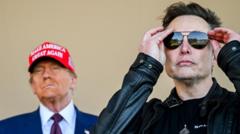Elon Musk's recent actions have drawn significant attention as he boldly opposed a bipartisan stopgap spending bill, prompting a chaotic response from Congressional Republicans. As negotiations unfolded, Musk's vocal discontent reached a fever pitch on his platform X, previously known as Twitter, influencing a faction of Republicans who rejected the proposal crafted by House Speaker Mike Johnson. This pushback collapsed what was predicted to be a straightforward funding solution, further complicating the legislative landscape.
On Wednesday, as Musk rallied conservatives online, former President Donald Trump chimed in, condemning the bill for including what he termed "wasteful spending," signaling a growing alliance between Musk and populist sentiments within the GOP. These events unfolded just days before a potential government shutdown, igniting debates about the appropriateness of an unelected billionaire wielding such influence over elected officials.
In response to Musk's pressure and Trump's subsequent alignment with the anti-funding voices, Speaker Johnson found his authority tested as key votes evaporated. Musk’s significant social media reach and financial clout have led some in the halls of Congress to refer to him jokingly as "President Musk,” reflecting both skepticism and concern among legislators.
Amid this political drama, the fractures within the Republican Party have been laid bare. With tension boiling over longstanding intra-party divisions, Speaker Johnson struggled to maintain cohesion among a narrow majority that has historically been fraught with dissent. This was exemplified by past leadership challenges and the contentious atmosphere surrounding various legislative priorities.
Despite aspirations that Trump's resurgence would streamline legislative objectives, the current conflict shows potential limits on his ability to unify the party. The challenge now remains: can Republicans find common ground, or will external influences like Musk continue to sow discord at critical junctures?
Looking ahead, Republicans are faced with both the possibility of a government shutdown and the risk of severe political blowback should they fail to present a united front. As they approach re-election bids, the predicament reveals possible vulnerabilities in the GOP's standing, with immediate implications for Speaker Johnson, whose leadership hangs in the balance.
For now, the unfolding narrative suggests that with controversy and competing agendas, GOP leadership may ultimately require navigating uncharted waters that combine the unpredictable influence of figures like Musk, the assertiveness of Trump, and a diverse Republican caucus that could prove difficult to steer towards consensus.




















